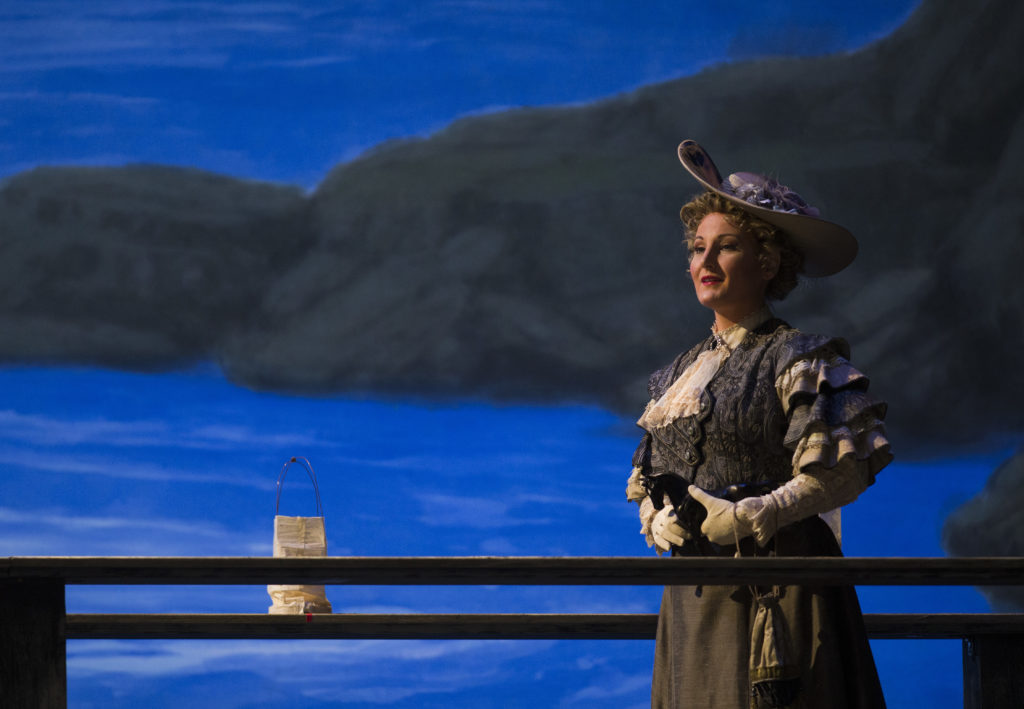By Gretchen M. Sanders
Opera singer Kathryn Grumley shares her fitness routine that helps her stay in shape for a standing ovation.

Kathryn Grumley knew in second grade she had a gift for music. She could play the piano and she could sing better than every student in her school choir. In high school, she started taking voice lessons and later studied opera performance at California State University, Long Beach.
Today, the 36-year-old soprano is an Austin Opera company member. Her roles for company productions include Annina in Giuseppe Verdi’s “La Traviata” and Kate Pinkerton in Giacomo Puccini’s “Madama Butterfly.” Last month, Grumley was the understudy for the role of Anna Sørensen in Kevin Puts’ “Silent Night,” and in April, she will cover for the part of Mimi in Puccini’s “La bohème.”
Grumley, a Phoenix native, has won national vocal competitions and can sing in Italian, French, German, Spanish and Russian, though she translates all opera scores into English while she’s learning them.
“I must understand the words I’m singing,” says Grumley, who auditions for every role she performs, often traveling to New York, Florida, Arizona, California and Europe to land gigs. This summer, she’ll also perform the national anthem at several Round Rock Express baseball games.
Working part time as an emergency-room nurse at St. David’s Medical Center gives her financial stability between singing jobs.
Here’s how this svelte soprano keeps fit for a standing ovation.

The A.M.:
“I wake up at 9 a.m., grab coffee and start warming up my voice. I do vocal exercises that are specific to a singing technique. Then I hit the gym. I memorize most of my music on a treadmill, wearing a headset with a pencil in my hair and an opera score open in front of me. People always give me funny looks.”
The Workout:
“I spend up to eight hours a day four to five days a week on singing lessons, coaching sessions and language practice. It takes all of my body to sing, and I must know which muscles to relax or engage. I burn calories just standing and projecting my voice. I sweat after singing certain passages. Being fit helps me sing and not get out of breath when I’m crouching, moving props or going up stairs on-stage. People in the back of a performance hall want to hear beautiful singing, even when I’m running. Add heavy costumes—pounds of material—plus tights, thick makeup, wigs and bright lights, and it’s a workout. I do CrossFit every other week and go to Life Time Fitness three or four days a week for exercise. The conditioning helps build lung power.”
The Diet:
“I try to avoid foods that could cause acid reflux. Bananas, hot tea and coffee help keep my throat warm and loose when I’m singing. I bring snacks to eat offstage during performances because I have dinner very late. We may arrive at 5 p.m. for a 7 p.m. curtain and not get home until midnight. Singing can make my throat dry, so I keep water and cough drops or ginger candy in the wings to help lubricate it. For dinner, I love making chicken Parmesan and getting creative with crockpot recipes.”
The Gear:
“I use a pencil and highlighter to mark my opera scores, which I order online from Amazon or a music store. Scores usually cost $40 to $125 each. I rehearse in comfortable clothes and wear a relaxed wedge shoe during auditions. Opera companies usually provide our costumes. I do my own hair and makeup if I’m singing in the chorus, and I work with a makeup artist if I’m in a bigger role. Costume, hair and makeup can last an hour and a half.”
The Motivation:
“You get to play pretend as a grown-up and make a career of it. We can express so much emotion through music. I can’t not sing.”
The Mindset:
“You never know unless you try. Be prepared. Who knows what the future holds?”
The P.M.:
“I put on warm, comfy clothes and pour a whiskey, bourbon or glass of wine. I listen to non-opera music, stay quiet and give my vocal chords a break.”
